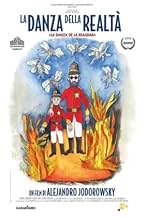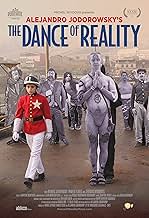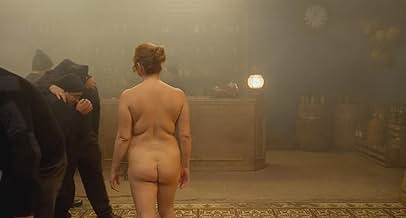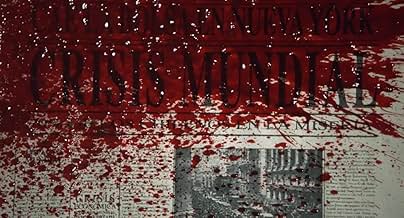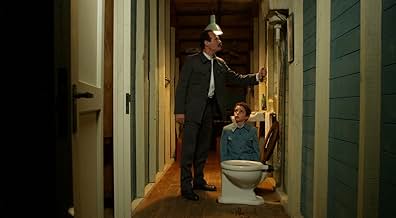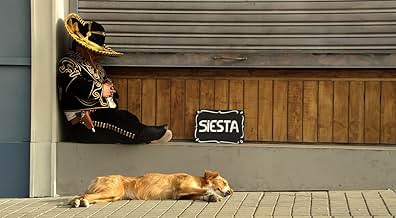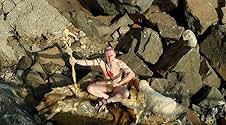La Danse de la réalité
In a little Chilean town, the son of an uprooted couple formed by a rigorous communist father and a loving but weak mother tries to pave his own path in a society that does not understand th... Read allIn a little Chilean town, the son of an uprooted couple formed by a rigorous communist father and a loving but weak mother tries to pave his own path in a society that does not understand their Jewish-Ukrainian origins.In a little Chilean town, the son of an uprooted couple formed by a rigorous communist father and a loving but weak mother tries to pave his own path in a society that does not understand their Jewish-Ukrainian origins.
- Director
- Writer
- Stars
- Awards
- 5 wins & 9 nominations total
- Theosophist
- (as Cristobal Jodorowsky)
- Jorobada
- (as Alizarine Ducolomb)
- Director
- Writer
- All cast & crew
- Production, box office & more at IMDbPro
Featured reviews
But it's almost redeemed by a final section where finally the older and younger director/character return for a farewell scene involving a dock and a boat. If this does turn out to be his last film it's one of the great film exits in history.
So it's too bad the script loses focus right in the middle and that the whole thing feels way too long. Might be a film that plays better if you don't watch it all in one sitting.
Visuals are typically vivid but now have a video quality that the HD "photography" that is distracting at first when comparing the richer film colors of his earlier work.
A worthy film that unfortunately can't sustain a strong first third.
I gotta admit I'm not always convinced. "The Incal" is a wonderful comics classic, but some of his later (serialised) books seem to fizzle out to nothing after they've taken years to complete. They've given me quite a bit of frustration - and the reviewers in the comics press often seem equally frustrated.
I bought his return to movie making "Santa Sangre" when it was first released on VHS back around 1990. And I love this movie! It's in my opinion completely coherent and satisfying, and I've seen it many times.
The long awaited DVD box-set of his older 1970s work was a bit of a disappointment. Some good scenes in the movies, but also a lot of semi- amateurish wannabe-spiritual 1970s-style hippie-rambling. The best part of the box was the very enjoyable documentary "La constellation Jodorowsky", which you might be able to find on you-tube with a bit of luck.
But as for his new movie: It's good. VERY good. Possibly even better than "Santa Sangre". In some ways it seems like a remake of "El Topo", except without the western-trappings and based more closely on his own childhood. The main character (Jodorowsky's father) undergoes much the same transformation as El Topo, but the narrative is much more coherent and gripping. I was lucky enough to attend a screening with Jodo's son (who played El Topo's son, and plays Jodo's father in this movie), and while I was mesmerized by the movie even before listening to Brontis Jodorowsky - who is a funny, cool and sensible down-to-earth guy - the information he gave me made me appreciate it even more.
Basically the first part of the movie is a magical realist version of Jodo's childhood. But then the 'psycho magic' therapy that Jodo practices (in his second career as a kind of Tarot-card - or whatever - therapist) starts to play a part, and the movie becomes a kind of exorcism of the hard asshole'ish macho-part of his dictatorial father - the movie gives the father-character the journey of learning he never had in real life, making him a better wiser man that real-life Jodorowsky is able to make (symbolic) peace with. Anyway, this may sound like a lot of nonsense, but it made a lot of sense when Brontis Jodorowsky talked about it, and it makes for a compelling movie, even without the background information. It's as good as any Fellini-meets-Latin- American-Magical-Realism-movie could ever hope to be.
Basically I'm just happy that Jodo has now made two movies and one graphic novel ("The Incal") that I'm able to embrace and enjoy 100%.
The film is as much about his father's journey through life as it is his own and the performances are so passionate and over-the-top that, along with his vivid pallet of colors, there is a 'cartoon' quality to the experience. All whimsy aside, this is one of his most cohesive narratives and he refers to 'The Dance of Reality' (his first film in 23 years) as a therapeutic endeavor – or 'psychomagic' – intended to heal residual, family-related psychological distress. Films made for an audience of one will always be a challenge but it's an absolute privilege to be allowed a peek into the mind of such a unique artist.
He also always appears in interviews with an infectious, joyful personality even when he talks about very serious things like art and living and good life and being screwed over in the movie industry (see Jodorowsky's Dune for more on that). But here, he gets to return as a filmmaker, after an absence of decades, and the results? An overused word is appropriate here: fantastic.
The Dance of Reality is Jodorowsky's (for him) straight-forward look at what it was like for himself, and his father Jaime, to go through the late 1930's in Chile - but in the only way that Jodorowsky can as one of the last old-school surrealists (by this I mean he could pal around with Salvador Dali like it was nothing). The movie might appear to be two movies: the first half more-so considers how rough things were for poor little 'Alejandrito', especially under rather Jaime Jodorowsky's strict "Be a Man" philosophy of parenting (and, of course, Jodorowsky cast his son, Brontis, to play his father, and the director appears as "himself" in certain parts). The boy has long locks of golden hair, and these get cut off (rather, the wig comes off!) and the boy has to deal with being tickled - "Don't laugh!" - slapped, dentistry without anesthesia, and being picked on by fellow boys for being Jewish.
The movie might appear to be all about the kid from the first half... but then Jodorowsky does something really interesting - though it's bound to split audiences - as he really follows the father in the second half (with a couple of trips back to the son, and the mother Sara who sings every one of her lines of dialog). It's both the son AND the father's story in Dance of Reality, and it's touching how the director charts what is kind of a tale of humbling for this father character as he tries, as the staunch anti-dictator Stalin-supporting Communist he is, to kill the ruler of Chile Ibanez, and fails, and goes through many trials and tribulations.
Often, we see, with his hands curled in a permanent state of vegetation! Dance of Reality is filled with heart and passion, and what's great about it is how much the director doesn't cheat any of the emotions. Another filmmaker, maybe one more self-conscious or ironic, might play for a wink some of these scenes where the mother talk-sings in her operatic tones and the father beats the boy or the town-folk go about in their crazy ways (sometimes with masks, sometimes it's amputees up in arms, pun intended), or the clowns or lepers or other freaks who the director loves to see on screen.
Jodorowsky doesn't play like that; for him, this is all magical realism, surrealism, any-kind-of-WTF-ism you want, but it's not something that is taken precisely as a goof, if that makes sense. Yet it's that which makes many scenes delirious, and deliriously funny. The cure for leprosy, for example, is a howler of a scene, even (or because) as it doesn't make logical sense.
Sense? Hey, it's this filmmaker, why not go along for the ride? And it's actually more straightforward and stream-lined than the acid-trip fever dreams of his early/notorious midnight movie work. Here, it's more reflective - it's hard not to compare of course to it's cousin, Fellini's Amarcord, also in the 1930's, about fascism, and big breasts. But I'll continue returning to this film if only for its love of filmmaking, of bringing great big colors on the screen - I don't know how the color timing worked or how much was used, but every color here is vibrant and alive, as if the director were still remembering this like it was today, and it feels that way - and how much the family unit it explored without full-on cynicism. You can look at this father-mother-son and they have their problems and issues (putting it lightly), but... they're real and painful and experience pain and the horrors of society, and persevere.
This is a powerful work of brazen, uncompromising, funny-sad-strange-illuminating art for those open to the experience.
Did you know
- TriviaThis was Alejandro Jorodowsky's first movie in 23 years.
- Quotes
Alejandro as a child: The darkness is swallowing everything. It's going to devour us.
Sara: Alejandrito, do I love you?
Alejandro as a child: Yes, Mama.
Sara: How much?
Alejandro as a child: From the sky to the earth.
Sara: This is not my love, it comes from God. I am merely the sender. As God creates all, so we all radiate His love. My son, the darkness loves you as much as I do, for it is God's shadow.
- ConnectionsEdited into Poésie sans fin (2016)
- How long is The Dance of Reality?Powered by Alexa
Details
- Release date
- Countries of origin
- Official sites
- Language
- Also known as
- The Dance of Reality
- Filming locations
- Production companies
- See more company credits at IMDbPro
Box office
- Budget
- $3,000,000 (estimated)
- Gross US & Canada
- $293,680
- Opening weekend US & Canada
- $24,768
- May 25, 2014
- Gross worldwide
- $558,636
- Runtime2 hours 13 minutes
- Color
- Sound mix
- Aspect ratio
- 1.85 : 1
Contribute to this page


![Watch Tráiler [OV]](https://m.media-amazon.com/images/M/MV5BYTE4NDM1YWItYTRmNi00OGQyLWJhZTYtYTY5OTU5NTJlOGY4XkEyXkFqcGdeQXRyYW5zY29kZS13b3JrZmxvdw@@._V1_QL75_UX500_CR0)


